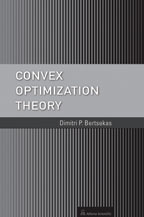ISBN: 1-886529-31-0, 978-1-886529-31-1
Publication: June, 2009, 256 pages, hardcover
Price: $59.00
A Condenced Version of the Book
Complete exercise statements and solutions: Chapter 1, Chapter 2, Chapter 3, Chapter 4, Chapter 5
Video of "A 60-Year Journey in Convex Optimization", a lecture on the history and the evolution of the subject at MIT, 2009. Based in part on the paper "Min Common-Max Crossing Duality: A Geometric View of Conjugacy in Convex Optimization" by the author.

An insightful, concise, and rigorous treatment of the basic theory of convex sets and functions in finite dimensions, and the analytical/geometrical foundations of convex optimization and duality theory.
Convexity theory is first developed in a simple accessible manner, using easily visualized proofs. Then the focus shifts to a transparent geometrical line of analysis to develop the fundamental duality between descriptions of convex functions in terms of points, and in terms of hyperplanes. Finally, convexity theory and abstract duality are applied to problems of constrained optimization, Fenchel and conic duality, and game theory to develop the sharpest possible duality results within a highly visual geometric framework.
The book may be used as a text for a theoretical convex optimization course; the author has taught several variants of such a course at MIT and elsewhere over the last ten years. It may also be used as a supplementary source for nonlinear programming classes, and as a theoretical foundation for classes focused on convex optimization models (rather than theory). It is an excellent supplement to several of our books: Convex Optimization Algorithms (Athena Scientific, 2015), Nonlinear Programming (Athena Scientific, 2017), Network Optimization (Athena Scientific, 1998), Introduction to Linear Optimization (Athena Scientific, 1997), and Network Flows and Monotropic Optimization (Athena Scientific, 1998).
"The textbook, Convex Optimization Theory (Athena) by Dimitri Bertsekas, provides a concise,
well-organized, and rigorous development of convex analysis and convex optimization theory.
Several texts have appeared recently on these subjects ... The text by
Bertsekas is by far the most geometrically oriented of these books. It relies on visualization to
explain complex concepts at an intuitive level and to guide mathematical proofs. Nearly, all the
analysis in the book is geometrically motivated, and the emphasis is on rigorous, polished, and
economical arguments, which tend to reinforce the geometric intuition."
From the review by Giorgio Giorgi (Mathematical Reviews, 2012): (Full Review)
"This is another useful contribution to convex analysis and optimization by D. P. Bertsekas, a prolific author who is able to put together a rigorous treatment of the subjects and a skillful didactic presentation. .... Unlike some other books on the same subject (for example the famous book by R. T. Rockafellar ... which does not contain a single figure), the book of Bertsekas abounds in geometrical illustrations of the properties and visual treatments of the problems. ... Some results stem directly from the author's research. Some of the more standard results are not usually found in other conventional textbooks on convexity."
From the review by Wolfgang Weil (Zentralblatt, 2013): (Full Review)
"The major aim of the book is to present the basic material in convex analysis and duality theory with an eye towards optimization problems. Convex sets and functions in finite dimensions are treated in great detail including topological properties, conjugate functions, hyperplane separation and polyhedral convexity. The duality theory developed then is not based on the conjugacy framework but on the closely connected, more geometrical concept of min common/max crossing pairs of points, which the author has invented. ... The concepts and proofs are explained in great clarity and are illustrated by various figures."
Among its features, the book:
develops rigorously and comprehensively the theory of convex sets and functions, in the classical tradition of Fenchel and Rockafellar
provides a geometric, highly visual treatment of convex optimization problems, including duality, existence of solutions, and optimality conditions
includes an insightful and comprehensive presentation of minimax theory and zero sum games, and its connection with duality
contains many examples and illustrations in the text, and exercises with complete solutions posted on the internet (see below)
connects with a supplementary freely downloadable, periodically updated chapter on convex optimization algorithms, including novel incremental subgradient methods, proximal and bundle methods, some of Nesterov's optimal complexity algorithms, and a unified framework for inner and outer polyhedral approximation
is structured to be used conveniently either as a standalone text for a theoretically-oriented class on convex analysis and optimization, or as a theoretical supplement to either an applications/convex optimization models class or a nonlinear programming class
Dimitri P. Bertsekas is McAfee Professor of Engineering at the Massachusetts Institute of Technology and a member of the prestigious United States National Academy of Engineering. He is the recipient of the 2001 A. R. Raggazini ACC education award, the 2009 INFORMS expository writing award, the 2014 Kachiyan Prize, the 2014 AACC Bellman Heritage Award, and the 2015 SIAM/MOS George B. Dantsig Prize.
The material listed below can be freely downloaded, reproduced, and distributed. The following sets of slides reflect an increasing emphasis on algorithms over time.